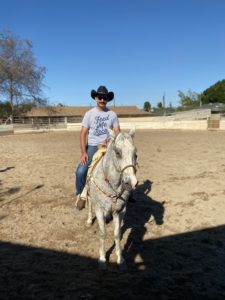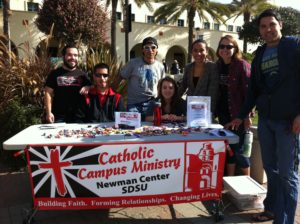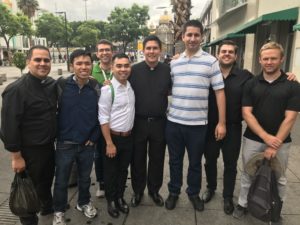On June 1, Archbishop José H. Gomez will ordain 11 new priests for the Archdiocese of Los Angeles at the Cathedral of Our Lady of the Angels.
In the days leading up to their ordination, we’ll be introducing a new soon-to-be Father. Los Angeles, meet your new priests!
Age: 30
Hometown: Oxnard
Home parish: St. Mary Magdalen Church, Camarillo
Parish assignment: St. Pancratius Church, Lakewood
The youngest of five (with four older sisters) to parents who emigrated from Mexico, Miguel Cabrera grew up in a Mexican culture that is so intertwined with Catholicism that it is often difficult to separate the two.
“It’s something that belonged to my culture, something that belonged to my family, but not something that belonged to me personally,” he said.

This faith was helpful but didn’t really come to the surface until later in life.
His childhood was filled with riding horses at his father’s and uncle’s small ranch and his family’s participation in Aztec-esque dance styles like danza de matachines (“sword dance”).
He went to Catholic school throughout his early life, eventually graduating from Santa Clara High School in Oxnard.
It wasn’t until he started attending college — first Ventura College, then San Diego State — that he actually began confronting the strength of his faith.
“I was faced with the decision of am I going to pursue the faith on my own or am I going to abandon it?” Cabrera said. “Now, a lot of people my age at that time, especially on the college campus, leave the faith while they're in college. And so I had a choice to make.”
The answer came in the form of a donut.
Cabrera heard that the Newman Center at San Diego State was hosting Mass and offering free donuts afterward.
Although he enjoyed the free breakfast — “it was a really good donut” — Cabrera decided to come back the next weekend. And the next. And again.
“I noticed when I got to the Newman Center that they were people my age, my peers, who were there without their family,” Cabrera said. “There were no parents that dragged them there. It was just them and they were happy to be there. I sensed a joy in them that I’ve always wanted.”

From there, his faith snowballed: He did his confirmation, joined a Bible study, and began attending adoration for the Blessed Sacrament. He learned how to really pray — not just say the words — something that even a lifetime of Catholic school hadn’t given him.
As he neared the end of his college career, with a focus on criminal justice, he decided to take a job with the Fellowship of Catholic University Students (FOCUS) ministry group. Thinking he would work there for two years, then return to criminal justice, God had other plans.
One year into his FOCUS work, he started feeling a call to the priesthood. He prayed on it. He went to a discernment retreat. And like many had done before him, he ignored it.
But when he attended the Theology of the Body Congress in Ontario, God questioned why Cabrera hadn’t taken action.
“I remember asking the Lord some follow-up questions myself being like ‘What if I am called to the priesthood, but I’m not happy?’ ” Cabrera said.
“In response, I felt the Lord just say, ‘Do you not trust me? If I am calling you to the priesthood, there’s nothing that will make you happier. And if I’m not calling you to the priesthood, that will be revealed to you while you’re in the seminary.’
“And here I am, seven years later, still in love with Christ and his Church.”

Although there’s a special place in his heart for young-adult ministry, Cabrera has found a love for ministering to the sick, especially those in the hospital.
“There isn’t a lot of relationship-building with patients that you might encounter because they might not be there for that long,” Cabrera said. “But that doesn’t make the encounters any less meaningful.
“Just seeing the comfort that it brings a family to be visited by someone who’s clergy or just having someone who comes in and cares to pray with them for a bit, reminding them that their spiritual care is important.”
